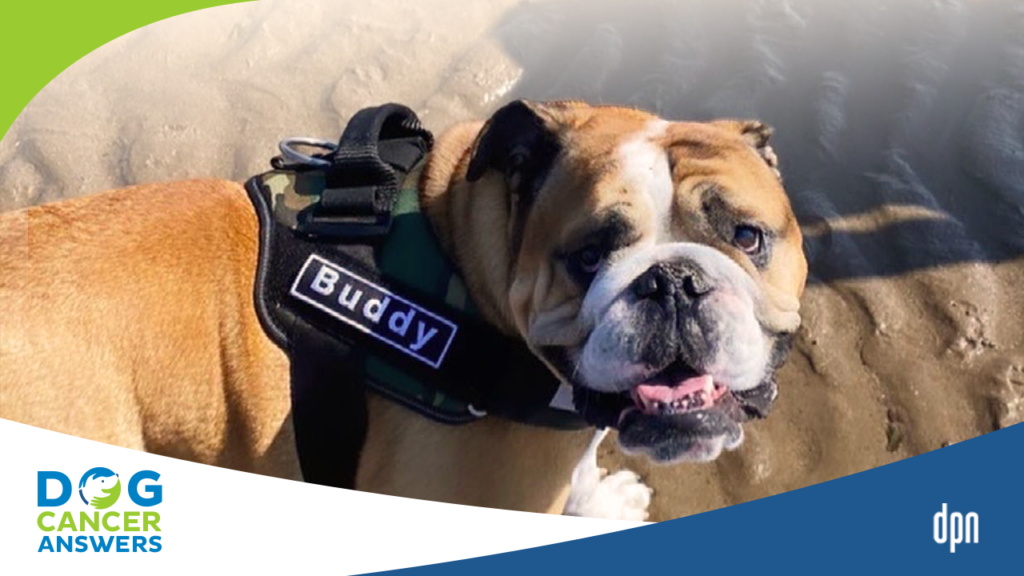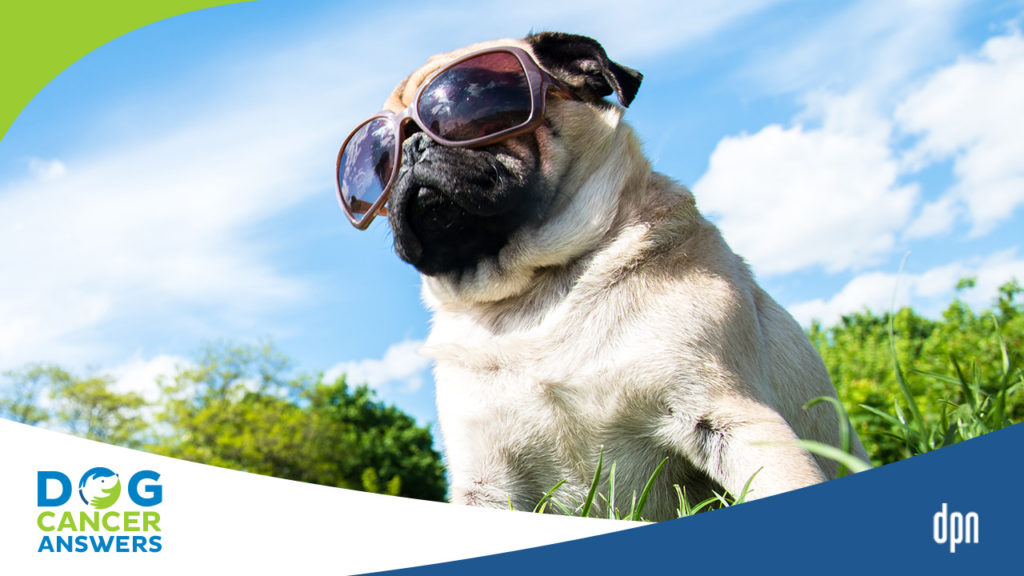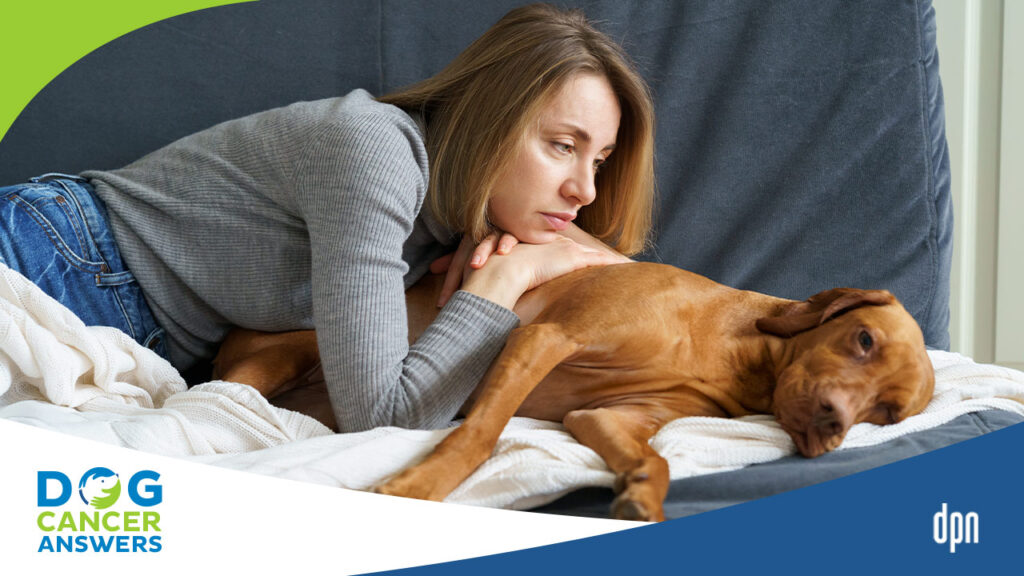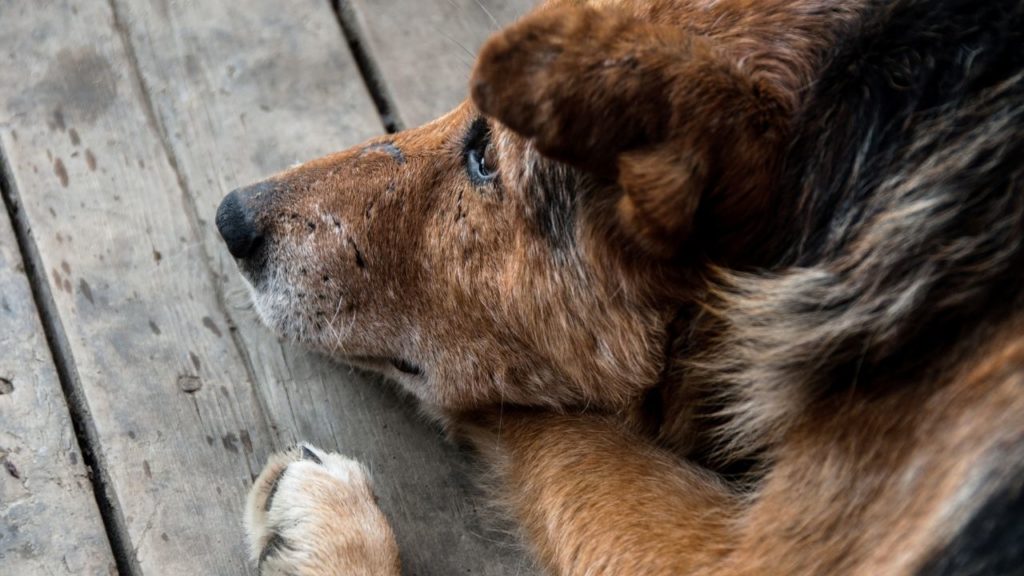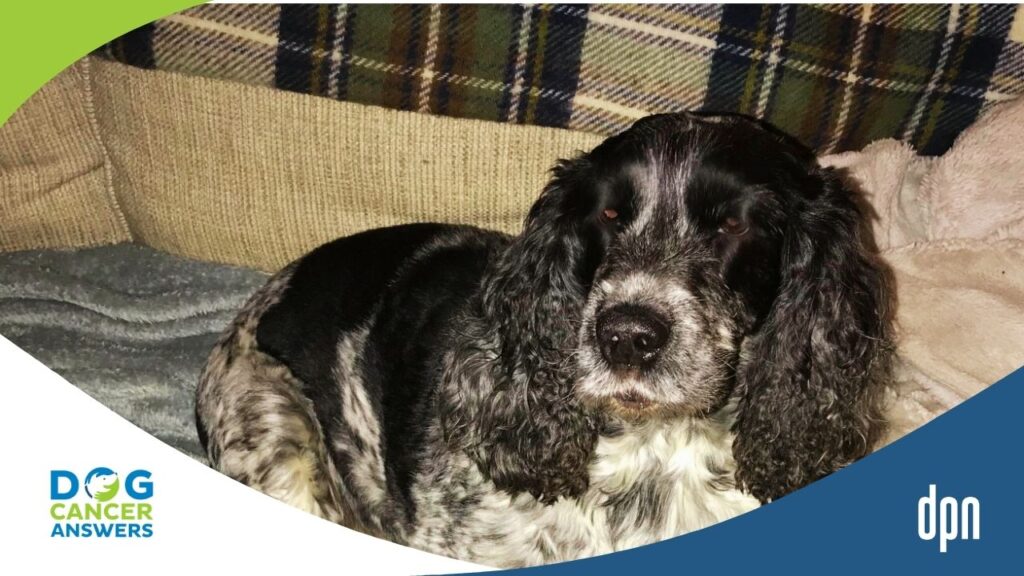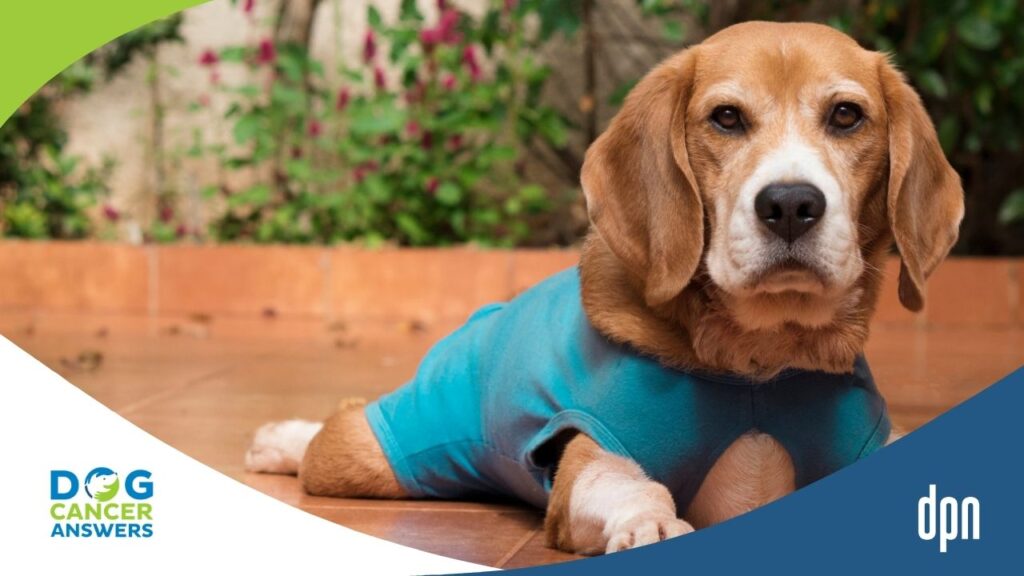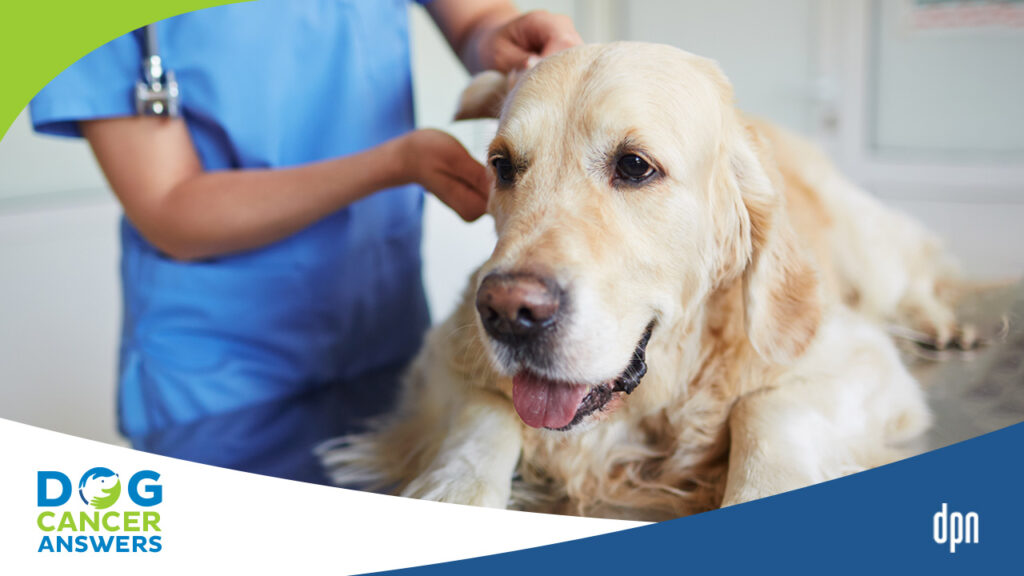>> Dr. Trina Hazzah: [00:00:03] Once you have a little bit of a better idea of where it is, then I think you can decide, well, how much time do we have, do we have time to start switching the food a little bit more? Do we have time for other site types of therapies or God forbid, if it’s involved a significant amount of, of the stomach then maybe it would be more just palliative type care and doing things just to keep him as comfortable as possible.
>> Announcer: [00:00:25] Welcome to Dog Cancer Answers, where we help you help your dog with cancer. Here’s your host, James Jacobson.
>> James Jacobson: [00:00:33] Hello friend, and thank you for joining us today. Here’s a question that a lot of us struggle with when our dog has cancer. What do we do when we’ve already done most of what we can do? Today’s caller is near the end of the prognosis date for her dog’s hemangiosarcoma.
And now there is a new symptom to wonder about. How should she handle it when she already knows that she doesn’t have many options left. To help answer her question, we have Dr. Trina Hazzah joining us. Dr. Trina is a veterinary oncologist who practices just outside of Los Angeles. She is also co-founder of the Veterinary Cannabis Society.
Dr. Trina, welcome, and let’s take a listen to our caller, whose name is Sharon.
>> Sharon: [00:01:23] Hello, my name is Sharon and I’m from New Jersey. My dog, who is 12 years old and is a Corgi, had a surgery on June 24th to remove a uh, hemangiosarcoma tumor, that was quite large. It was 19 centimeters by 15 centimeters, and they also had to remove one adrenal gland, and one kidney at the same time. He has been doing great. I’ve changed up his diet. Tremendous, uh, change. They recommended, the surgeon, uh, did not get all the borders, was not able to remove everything, of the tumor. He had no chemo or anything else, but the surgeon recommended Turkey Tail mushrooms. So I researched mushrooms and I have him on Turkey tail, I have him on a blend of seven different mushrooms. I also have him on EverPup vitamin. And I’ve changed his food to organic canned dog food. He was on a dry, um, a good dog food, but after reading, I thought the canned would be better. I give him vegetables, pumpkin, a fish oil, in his food. So he’s doing really great.
The only thing is, and this is my question. It just started a week ago. He has, a like, a gag. Nothing comes up, but he does it maybe four times a day. You know, hours in between. And so I’m wondering, I have not had any other testing done because he can’t have any more surgery, but I’m wondering, you know, I did get the whole report that his prognosis is not really good with the hemangiosarcoma, um, that they told me the tumor would come back in three to four months and may have no idea where it would come back, and that it’s in the blood. So my thinking is maybe it’s his lung. I’m not sure. My question is what can I do.
>> James Jacobson: [00:03:39] Dr. Trina.
>> Dr. Trina Hazzah: [00:03:41] Thank you for your question. And I’m sorry to hear about your pup. I think hemangiosarcoma, unfortunately is just so stupid aggressive, and, you know, especially if you don’t get it all, right, it’s tough. Because even when a surgeon says, you know, we got all of it, we got margins. I’ll just tell you this, not just to make you feel better, but to tell you, even when you get all the margins, there’s usually what they call microscopic disease, meaning leftover little bits of cancer, and it can be in many, many places, the liver, in your case, I’m assuming that it was a primarily of the spleen initially, and then maybe involved the kidney or the adrenal gland, which is why they removed it. I am a little concerned about the gagging. I don’t know if it’s lung as much as it’s something going on in the abdomen and we know that’s where the disease was initially. So. I think it would be worthwhile getting an ultrasound, just to see where you are from a disease status perspective.
Has it started to involve the stomach, let’s say. And once you have a little bit of a better idea of where it is, then I think you can decide, well, how much time do we have, do we have time to start switching the food a little bit more? Do we have time for other site types of therapies or God forbid, if it’s involved a significant amount of, of the stomach, then maybe it would be more just palliative type care and doing things just to keep him as comfortable as possible.
Another thing that I honestly think works sometimes is Pepcid AC. Like, I know it doesn’t make sense, why Pepcid sometimes work so well for animals, but, and I find it in cats, it can also work wonderfully, but when animals are just gagging or regurgitating, sometimes Pepcid AC can work really well. And you can speak to your veterinarian about that and dosages and so forth.
That’s an easy fix, right. And then an anti-nausea medication could also be helpful in helping prevent some of the gagging, and I would speak to your vet about that. Obviously my interest is with cannabis medicine and I think cannabinoids can absolutely be helpful, and anti-nausea, and anti-pain. So if there’s anti-inflammatory, so if there is a component of discomfort for the cancer, say coming back and it’s eliciting some sort of nausea response, then I think cannabis could be very helpful for that.
There’s a website called VeterinaryCannabis.org. You can go on there and have actually an indirect consult with me through that website. And I’m happy to give you some information through there. They have what they call a veterinary cannabis counselor, who will, you’ll end up speaking to, but I can give them some information through them.
And then another person I was thinking while you were speaking, was there’s an integrative oncologist, in Red Bank, New Jersey. And I heard you’re in New Jersey, named Dr. Kendra Pope, who is lovely. Like she is just the sweetest and smartest, and she practices, it’s almost all more integrative practice, with no chemo, and if so, it’d be just kind of pills or something like that, but she would be able to give you a little bit more of an insight after seeing your pup doing a, a holistic exam, like they, it’s a specific, a Chinese herbal exam to give you ideas if there’s any certain Chinese herbs that might be able to help support your pup. From a food perspective, I would try to do as bland as you can, especially with this type of gagging, you know, make sure that it’s something that is easily digestible.
And I love the idea of that, you’re doing veggies. I think it’s great, but just make sure they’re at least steamed, they’re not raw. Cause that might be a little bit difficult for them to, you know, really digest carefully. I honestly really think your Turkey Tail is a phenomenal idea. We do that. I oftentimes do Chinese herbs along with mushroom therapy for my hemangiosarcoma cases.
Dr. Pope would be able to speak with you a little bit more about Chinese herbs, about vitamin D. We do a lot of vitamin D evaluation and supplementation, with hemangiosarcoma. But I think really getting an idea of where the disease status is, will be very helpful to help give you an idea on time, because I’d hate for you to do all this stuff, and maybe we don’t have that much time or, let’s be positive and say, things are actually looking okay. Some of this other stuff can be implemented fairly quickly and hopefully be able to prolong the quantity, but also the quality.
>> James Jacobson: [00:07:58] And it all starts with an ultrasound. Which is a pretty simple thing.
>> Dr. Trina Hazzah: [00:08:01] Yeah.
>> James Jacobson: [00:08:01] OK.
>> Dr. Trina Hazzah: [00:08:02] Yeah. I would do an ultrasound. And I think it’s reasonable to do x-rays if you’re worried about the lungs, if he’s coughing or doing any of that. But I think an ultrasound will give you more information right now.
>> James Jacobson: [00:08:10] Well, Sharon, thank you for your call, Dr. Trina Hazzah, thank you for being with us today.
>> Dr. Trina Hazzah: [00:08:15] Thank you.
>> James Jacobson: [00:08:17] We will be right back after a short break with more information about how to find a good veterinarian in your area to help you with your dog’s cancer, no matter what stage is in. We’ll be right back.
We are back with a reminder about an important resource for you on our companion website, which is DogCancerBlog.com. Dr. Trina specifically recommends a holistic veterinarian to Sharon, and we’ll be sure to put her name and contact information in the show notes for today’s episode. Dr. Trina’s recommendation also reminded me about how many other wonderful resources we have for you. There are several articles on Dog Cancer Blog about how to find and interview veterinarians, whether you want to find a brand new one, or get a second opinion. There’s also a really important article where readers of Dr. Dressler’s book, The Dog Cancer Survival Guide, do what Dr. Trina just did, and make a specific recommendation for a vet in their area. Dr. Dressler’s book is our show’s main sponsor, and in it, he describes what he calls the Full Spectrum approach to dog cancer. And all the veterinarians you hear on Dog Cancer Answers are basically Full Spectrum veterinarians. They’re open-minded, and they’re non-dogmatic, pardon the pun, but they are, they’re non-dogmatic.
They embrace methods and treatments that have evidence working for them, even if some of the things that they recommend are considered quote unquote, outside the box. So that means that these veterinarians work with food and supplements and conventional methods like surgery or chemotherapy or radiation, in addition to food and supplements and other things. At least they aren’t opposed to using traditional standard of care practices.
These Full Spectrum veterinarians like to use whatever has been shown to help, even if it comes from another tradition of medicine. And in the article that is linked to in the show notes for today’s episode, you will find dozens and dozens of veterinarians who, according to readers of Dr. D’s book, are just like the ones you hear on this podcast.
They’re open-minded and they’re willing to work with you to try things that may not seem conventional. They cover the Full Spectrum of treatments. You can find that article as well as several others and links to the Veterinary Cannabis Society in the show notes to today’s episode. Those are in your podcast app, and they can also be found on our website, which is DogCancerAnswers.com.
That is where you will find all of our back catalog of shows, as well. Take a look through our back catalog on our website or on YouTube or in your podcast app, because with cancer being the number one killer of dogs, it’s likely that you will need to listen to some or several of those episodes, or at least someone you know and love will.
So don’t hesitate. In fact, I encourage you, please tell a friend about Dog Cancer Answers and also tell your veterinarian about the show. Especially if they have a Full Spectrum approach. We keep hearing that veterinarians are using this podcast to keep up to date, and we’re so happy about that. Also, please rate and review this show in your podcast app of choice.
And by all means, sign up for Dog Cancer News. That is our amazing free newsletter. You can do that at the website, DogCancerNews.com. That is it for today’s show. I’m James Jacobson. And as always on behalf of everyone here at Dog Podcast Network, we wish you and your dog a very warm aloha.
>> Announcer: [00:12:21] Thank you for listening to Dog Cancer Answers. If you’d like to connect, please visit our website at DogCancerAnswers.com or call our Listener Line at (808) 868-3200. And here’s a friendly reminder that you probably already know: this podcast is provided for informational and educational purposes only.
It’s not meant to take the place of the advice you receive from your dog’s veterinarian. Only veterinarians who examine your dog can give you veterinary advice or diagnose your dog’s medical condition. Your reliance on the information you hear on this podcast is solely at your own risk. If your dog has a specific health problem, contact your veterinarian.
Also, please keep in mind that veterinary information can change rapidly. Therefore, some information may be out of date. Dog Cancer Answers is a presentation of Maui Media in association with Dog Podcast Network.



